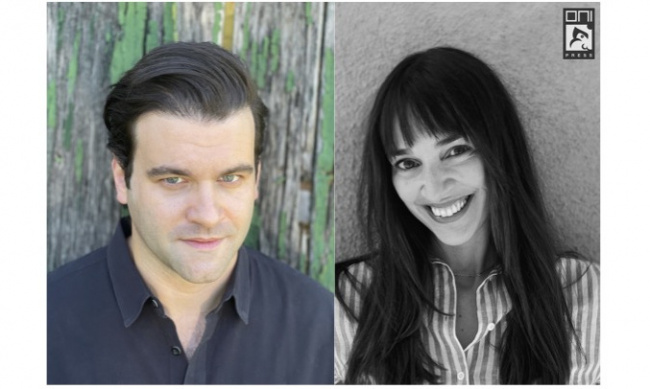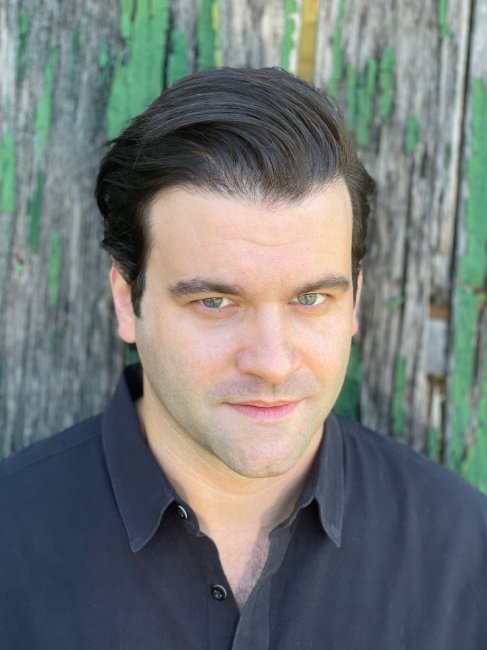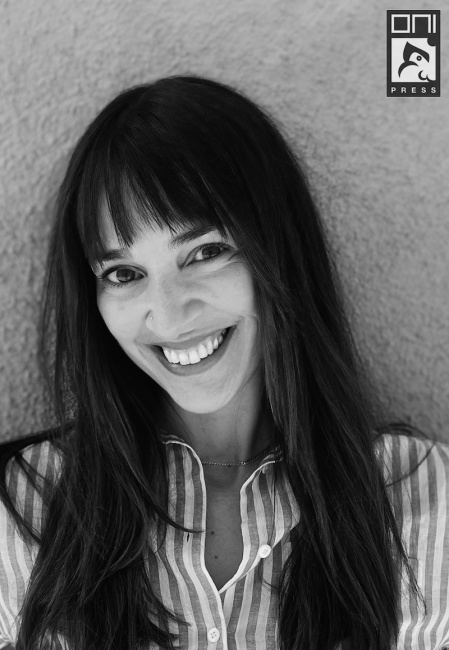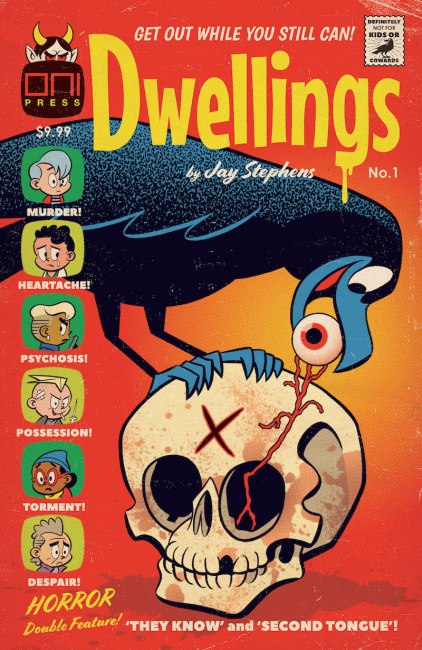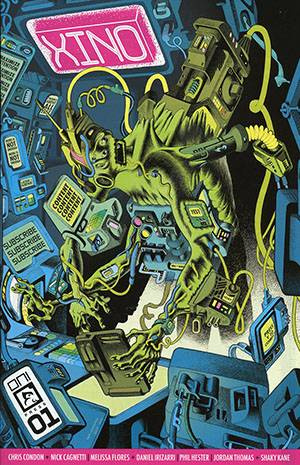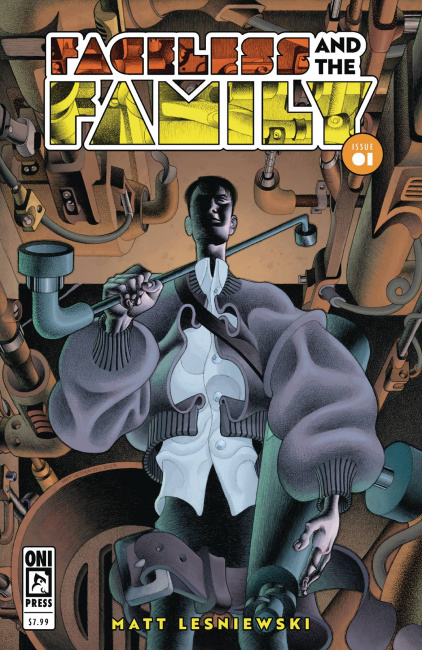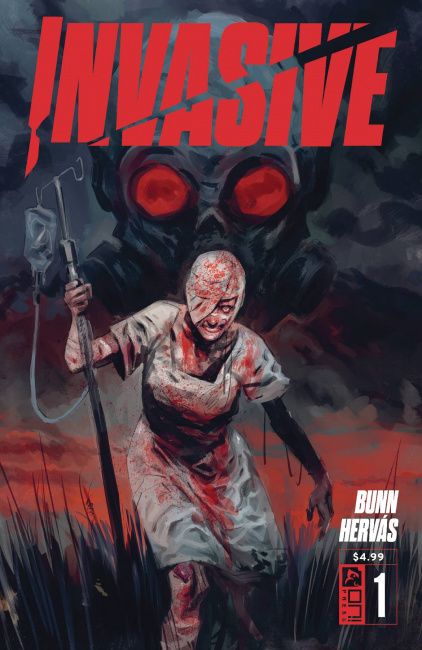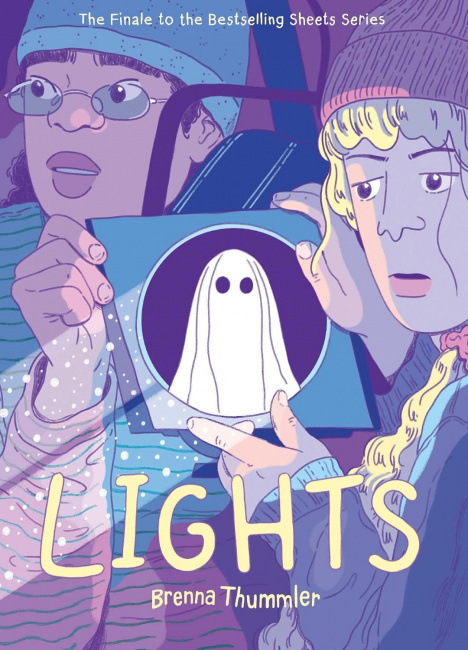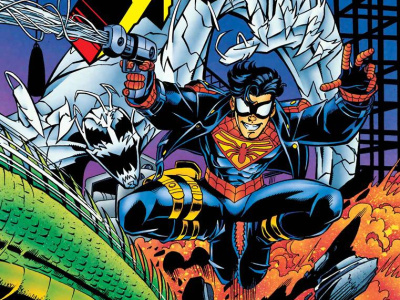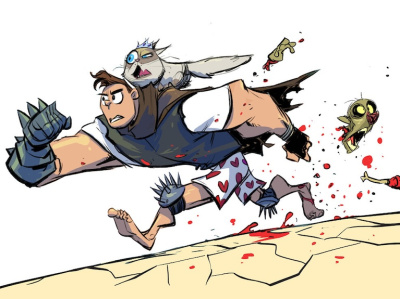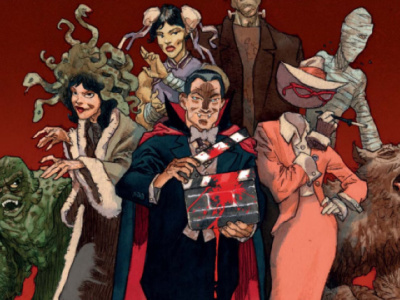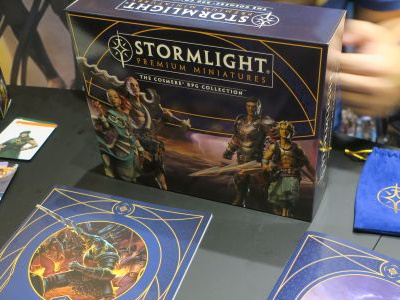ICv2: I want to start out with a baseline, which is your assessment of the current state of the comics business, both in the Direct Market and the book channel.
Hunter Gorinson: Overall, the state of the business is very strong. This is maybe one of the best times in the history of comics as a medium to be publishing comics. We're definitely in a transitory time right now, but with that transition comes a chance for a lot of opportunity.
Transitory in what sense?
Gorinson: Things that were held as common wisdom a decade ago, or a decade before that, seem to be no longer holding as much water as they once did.
Back when Sierra was still at Dark Horse, and I was still at Valiant, if you were launching an independent comic book series, it absolutely had to be an ongoing book. There's a lot stacked against the concept of the ongoing series right now. In fact, we're seeing a lot of success with shorter‑form miniseries that have higher page counts and a variety of different factors worked into them. That's just one example of many. A lot of things are changing right now, hopefully for the better. It's certainly given us the courage to be a little bit experimental going forward.
Also on the big picture side, are those channels up or down this year for you or in what you're seeing for the market overall?
Gorinson: I am happy to report, and hopefully this is breaking news for ICv2, every channel at Oni is up right now.
Do you think that's a general market condition or is that Oni?
Gorinson: I can't speak specifically for other publishers but anecdotally, I don't believe that's the case for every other publisher.
One of the things that we've been trying to do is bring a fresh, strategic look towards the Oni publishing line, and in the short time that Sierra and I have been managing the business, we've already started to see incremental growth.
Sierra Hahn: Just to add to that a little bit, Hunter and I are still new to Oni. Hunter started in December, I started in February. We have a lot of Direct Market experience and saw an opportunity to get some titles to the market faster, where we didn't have single‑issue monthly SKUs or miniseries for late summer or fall. We're seeing the comics community embrace monthly comics from Oni Press in a bigger way, in part because they didn't have a lot of single‑issue comics for people to buy into.Gorinson: One of the things we first put our heads together on was thinking about things that we could get out in 2023 that would be easy to get to market but had a high creative pedigree.
[One is] Jay Stephens' Dwellings, a book I first encountered over the course of the pandemic when I backed the Kickstarter campaign, which we started releasing in October. The complete series will be out by December. It had tremendous retailer response and a huge increase of FOC orders (see “Oni Announces Two ‘Dwellings’ Covers to Be Allocated”). It exceeded our expectations to almost every degree.Another one is called Faceless and the Family, by an Eisner Award‑nominated cartoonist named Matt Lesniewski, which began its life as an original graphic novel on Zoop. Matt had done a tremendous amount of work for places like Dark Horse and AdHouse. I saw a huge audience for his artistic vision in the Direct Market, and so we're serializing that book beginning in November.
You have really rebuilt the whole Oni management team. As you did so, what changes were you trying to make from the previous team?
Gorinson: Let me say up top, I have an incredibly high amount of respect for Oni historically. The people who have worked at Oni have contributed a lot to the industry. They built the foundation of the company that we're trying to push forward into the next 25 years of growth and hopefully influence the comics medium as a whole. I don't think there's so much changes that are being made to Oni, but there are things I would want out of any publisher right now and that any publisher would stand to pay attention to.
One of them is having a world‑class editorial team to help creators do their best work: the reason why I felt so strongly about bringing Sierra on to the team. She's done an absolutely phenomenal job. We're very fortunate to already have a working relationship together from our time at BOOM! Studios. She has an incredible track record and Rolodex behind her and been nothing but exceptional in refreshing our publishing portfolio, as well as working with our editors on a day‑to‑day basis to try and pass along the skills that say, "This is how you build comics," which is a tough thing.
The other part of it is marketing and communications, something that I take extremely seriously. If I have one criticism of the market broadly right now, it's that there's more great comics being produced at a higher level of craft than ever before, but most people have no idea what any of them are about or that they even exist. As an industry, we have to get a lot better about communicating what story creators are trying to tell and what makes it special, what makes them special, and why audiences should be interested in reading them. That's the drum I will bang all day long and it's certainly something that the team at Oni has heard me say to infinity at this point, that I want there to be broad awareness for the books we're producing. The onus is on us at the publishers to make sure that happens for the creators who've entrusted us with their creations.
What are the biggest changes editorially? I'm thinking of things like formats, number of releases, in addition to the aesthetic and artistic choices you're making.
Hahn: Part of what we're trying to do is create a balance between workloads, a parity across the editors and the team, bring in more support staff, so we're not so top‑heavy and we're able to train people up from their respective positions. We want people to know that there's growth opportunity within the department and have them invested in the legacy of the work that they're doing and the projects that they're bringing on.
On the creative side of things, the thing that Hunter and I keep talking about is wanting to have fun making comics. It's a medium that we both love and have a deep respect for, and I think everybody who works in this medium shares that with us. We want to tell stories that are a little bit counterculture, a little bit weird. We don't want to mold stories that look like the polished, perfect film and TV packet, but as a comic first, and recognize how this medium uniquely allows you to stretch the boundaries of visual storytelling in such a remarkable way.
We want to be artist‑forward. We want to talk about presentation. We want to talk about aesthetics and styles. That's what gets your imagination going as a reader. That's what allows you to get lost in new worlds with characters that you want to invest your time and energy into.
Hunter, maybe you could address the part of the question about change in number of releases or format mix.
Gorinson: Sure. Oni, over the past five or six years, it's safe to say, had made a shift away from the Direct Market and started pursuing more original graphic novels. OGNs are central to Oni's legacy. A book like Scott Pilgrim or The Tea Dragon Society or Gender Queer, these all began their lives as original graphic novels. They're still going to continue to be a vitally important piece of what we do going forward.
I do think in the process of shifting that focus so aggressively over to OGNs, Oni lost what had been a once‑dominant position in the Direct Market, and along with that, a lot of its ability to find purchase in the daily, weekly, monthly, conversation of what's happening in comic culture. Participating in that segment of comics culture to a greater degree is important to having Oni occupy the important historical niche that it has occupied in the industry, which is to be the left‑of‑center, quasi‑counterculture comic book publisher. Having us on shelves to a greater degree on Tuesdays and Wednesdays will help accomplish that goal.
What's the size of Oni versus a year ago in terms of the number of people? I think it was 30 before the layoffs, then 18. Where are you at now?
Gorinson: We're just about up to 25. We just announced that [we hired] Spencer Simpson, formerly the Director of Marketing and Sales for DC Comics, and prior to that, Director of Sales for BOOM! Studios (see “Exclusive: Oni Press Names Spencer Simpson as Director of Sales”). Truly one of the best people at what he does in the industry. An incredibly smart, razor‑sharp guy.
We'll be announcing several more prominent hires over the course of the next month. We'll hopefully make a big announcement right before New York Comic Con.
What is your sales staff now? You've got Spencer at the top and Michael Torma's in there for the Direct Market (see “Exclusive: Oni Hires Third Eye Comics Manager to Head Up Sales Team”). Anybody else retailers should know about?
Gorinson: The other person worth mentioning there is Katie Sainz. She's our Director of Marketing, who also has a tremendous amount of experience and expertise in working with the book market, especially libraries, which is something she's incredibly passionate about. She's been an exceedingly valuable voice as we continue to pay attention to that market, too.
In terms of the core sales team, our big strategic sales brain is Spencer Simpson and then Michael Torma. He brings with him a tremendous amount of expertise and credibility in talking about how to work with retailers, how the market operates, and ways that we can make potential inroads into expanding our operations at both.
One of the first changes you made on the business‑practices side of things was to make your non‑licensed comics returnable. How is that program affecting sales, or can you tell?Gorinson: It's been great. We saw phenomenal response. The very first one that had returnability attached to it was called Lamentation by Cullen Bunn and Arjuna Susini, which came out in May. Then we followed it up with XINO, which was a science fiction anthology by a combination of really well‑established cartoonists and creators and rising talent. I'm happy to say they both had incredibly healthy, strong debuts.
In fact, we've only seen our numbers in the Direct Market continue to go up as we've expanded that returnability. By the time we get to December of this year, we will have four or five books that are returnable, which may be more than any other publisher, but I wanted to make sure that we were giving retailers the maximum amount of tools possible to help get our books into readers' hands across 2023. We'll probably continue to tweak and refine that system as we head into 2024.
Number one order of the day at Oni, and something that I talk about with both Spencer and Torma on an ongoing basis, is returnability is one of the tools that we have to pull out of our magic bag of tricks. As Oni continues to scale up in the Direct Market and take it with a level of seriousness that is vital to the success of the company, what are the other tools in that bag that we can give retailers? Watch this space. We'll be talking a lot more about Oni's retailer‑facing initiatives over the course of probably the next six months.
You've mentioned a couple of your big releases for the rest of the year. What should retailers be looking for in terms of the most important Oni releases over the next six months?
Gorinson: Milton, we love all of our children the same! [laughs]
Retailers want to know, "What are the A, B, Cs, man?" They can't order everything the same.
Gorinson: I know. I'm just joshing you. In terms of our biggest pushes through the end of the year, we have a handful of Direct Market books coming up.
We're still putting out Jay Stephens' Dwellings. It's on a bimonthly schedule. It has a relatively high price point at $9.99, and we wanted to make sure that we gave that one room to breathe, which is why: it's at the higher price point. It also has a large page count at 72 pages an issue. The second issue is going to come out in October, third one in December.
Coming out in October, we also have a book called The Man From Maybe, which is by a relatively new writer named Jordan Thomas and a very well regarded UK artist named Shaky Kane. That's a double‑sized, 48‑page issue.
In November, we have the aforementioned Faceless and the Family by Matt Lesniewski. Matt is going to be, in 10, 15, 20 years, a talent that we look back on as someone who has made a huge impact on the medium. He gets very embarrassed when I compare him to Richard Corben and Moebius, but the comparison is warranted. He's a genius. In terms of straight up the middle, die‑hard comic book stuff that every fan would be interested in, we have a book coming called Invasive in December by Cullen Bunn and Jesús Hervás. Cullen has a large body of work behind him at Oni, going all the way back to books like The Sixth Gun. I’m so excited to have him working on something brand new and a little bit outside the box.Invasive is very much a boundary‑breaking horror book. The mission that Cullen was brave enough to take on was to do the thing that no other publisher will allow you to do. It's a really, really envelope‑pushing horror book. We'll see a strong response to that. In terms of original graphic novels, Sierra, I'm sure you have a few. What's top of mind for you?
Hahn: It's definitely Brenna Thummler's Lights, which is out this month, the third volume of the Sheets trilogy. It's a great time for people to jump on board with that title. Brenna is an incredible storyteller. People are going to be glomming on to that one this month.We're really excited about the Rick and Morty manga collection that will be coming out toward the end of the year. It's super fun. It's ridiculous. It's everything that you want from Rick and Morty, but in a new format. People are going to be excited about that one as well.
Thanks very much for your time, both of you. Anything else you want to say to the retailer audience that reads ICv2?
Gorinson: I would say thank you for your ongoing support. We take Oni's relationship with the Direct Market, with independent bookstores, with anyone who cares about the books that we put out extremely seriously. We plan on continuing to put out great books, working with retailers on a one‑to‑one basis when possible.
Sierra and I have been working on a lot of stuff behind the scenes. We'll finally be starting to see a lot of that come to fruition over the course of the next several months. As we get closer to New York Comic Con, watch your inbox; you're going to have a lot of news coming. I promise.



